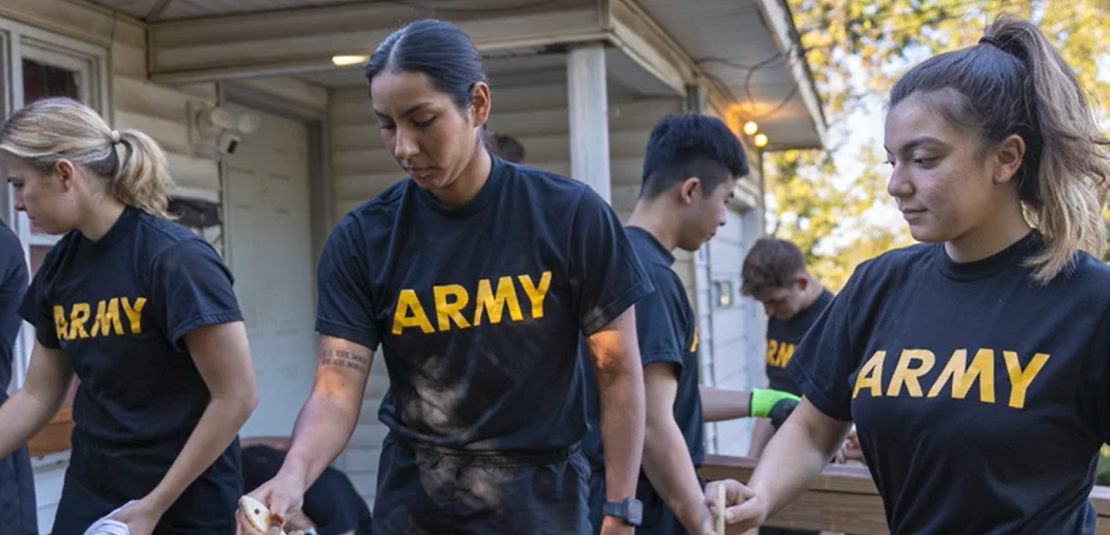
- Details
- By Chuck Hoskin Jr
Guest Opinion. The Cherokee word “gadugi” is so ubiquitous in our culture that everyone, even if they’re not fluent in the Cherokee language, knows what it means: to work together as a community for the good of us all. This is one of our most cherished values.
Since launching in December 2023, the Cherokee Nation’s Gadugi Corps has brought this value to life. The program has rapidly grown into a powerful presence of service, volunteerism and community building for our tribe.
A wide array of volunteer opportunities — from disaster relief and storm cleanup to educational camps and environmental conservation — have enabled Gadugi Corps participants to give back to our communities and strengthen bonds between Cherokee citizens. We are so proud to see this program create a ripple effect of positive change across our 7,000-square-mile Cherokee Nation Reservation and around the globe, wherever our citizens live. I know when many Cherokees hear about our commitment to one another, they are moved to join in themselves.

One of Gadugi Corps’ greatest successes is its unique ability to bring Cherokees of multiple generations and backgrounds together. We have seen Cherokees from elders to youth, from living on the reservation to at-large citizens, from urban to rural, all joining in the spirit of service. Every one of them gains a deeper connection to the core values that have sustained Cherokee people for centuries.
Under the strategic leadership of Gadugi Corps Director Shawn Crittenden, we have met immediate needs and instilled long-term Cherokee pride. And we are only getting started, as the potential for growth is tremendous.
Expanding our outreach to college-aged Cherokees through partnerships with universities, non-profit groups and online platforms will ensure we engage more young leaders who are eager to jump in and lend a hand.
This year, we’ve had several college students, including groups from Kansas State University and the University of Connecticut, on the reservation to volunteer during their Spring Break. They worked on things like building handicap ramps, conducting neighborhood cleanup efforts and cemetery maintenance, while also learning more about Cherokee history and culture.
Opportunities specifically designed for our elders are also coming online – like the “Gadugi Corps Legacy Living Initiative” and a partnership with Grand Gateway Economic Development Authority to support its “Senior Companionship Program.” These efforts will provide meaningful volunteer opportunities for our elders, such as making handwritten notes for school backpack programs and Valentines for Veterans and helping put together emergency preparedness kits and care packages. These are simple but very impactful acts, and allow our elders to make a difference in our communities.
We’ve also expanded our ability to use digital tools, launching a Gadugi Corps webpage and improving access on the Gadugi Portal to provide a streamlined way for citizens to sign up for all volunteer opportunities.
The success of Gadugi Corps shows the world what we have always known: the power of Cherokee values endures. Service is not just a program — it’s a way of life for the Cherokee people, and we can ensure that every Cherokee citizen, no matter where they live, feels that they are part of building a stronger collective future for our Nation.
For more information about volunteer opportunities or to join the Gadugi Corps, please visit https://gadugi-corps.cherokee.org/
Chuck Hoskin, Jr. is the principal chief of the Cherokee Nation.
More Stories Like This
The Absence of October's Job Report Shows Why Native American Communities Need Better DataTribal IDs Are Federally Recognized. ICE Agents Are Ignoring Them.
Thanksgiving: Part of "Broken Circle Holiday"
Thanksgiving is a Tradition. It's Also a Lie
Decisions About Us, Without Us: Education Dismantling Ignores Tribal Nations
Help us tell the stories that could save Native languages and food traditions
At a critical moment for Indian Country, Native News Online is embarking on our most ambitious reporting project yet: "Cultivating Culture," a three-year investigation into two forces shaping Native community survival—food sovereignty and language revitalization.
The devastating impact of COVID-19 accelerated the loss of Native elders and with them, irreplaceable cultural knowledge. Yet across tribal communities, innovative leaders are fighting back, reclaiming traditional food systems and breathing new life into Native languages. These aren't just cultural preservation efforts—they're powerful pathways to community health, healing, and resilience.
Our dedicated reporting team will spend three years documenting these stories through on-the-ground reporting in 18 tribal communities, producing over 200 in-depth stories, 18 podcast episodes, and multimedia content that amplifies Indigenous voices. We'll show policymakers, funders, and allies how cultural restoration directly impacts physical and mental wellness while celebrating successful models of sovereignty and self-determination.
This isn't corporate media parachuting into Indian Country for a quick story. This is sustained, relationship-based journalism by Native reporters who understand these communities. It's "Warrior Journalism"—fearless reporting that serves the 5.5 million readers who depend on us for news that mainstream media often ignores.
We need your help right now. While we've secured partial funding, we're still $450,000 short of our three-year budget. Our immediate goal is $25,000 this month to keep this critical work moving forward—funding reporter salaries, travel to remote communities, photography, and the deep reporting these stories deserve.
Every dollar directly supports Indigenous journalists telling Indigenous stories. Whether it's $5 or $50, your contribution ensures these vital narratives of resilience, innovation, and hope don't disappear into silence.
 The stakes couldn't be higher. Native languages are being lost at an alarming rate. Food insecurity plagues many tribal communities. But solutions are emerging, and these stories need to be told.
The stakes couldn't be higher. Native languages are being lost at an alarming rate. Food insecurity plagues many tribal communities. But solutions are emerging, and these stories need to be told.
Support independent Native journalism. Fund the stories that matter.
Levi Rickert (Potawatomi), Editor & Publisher
